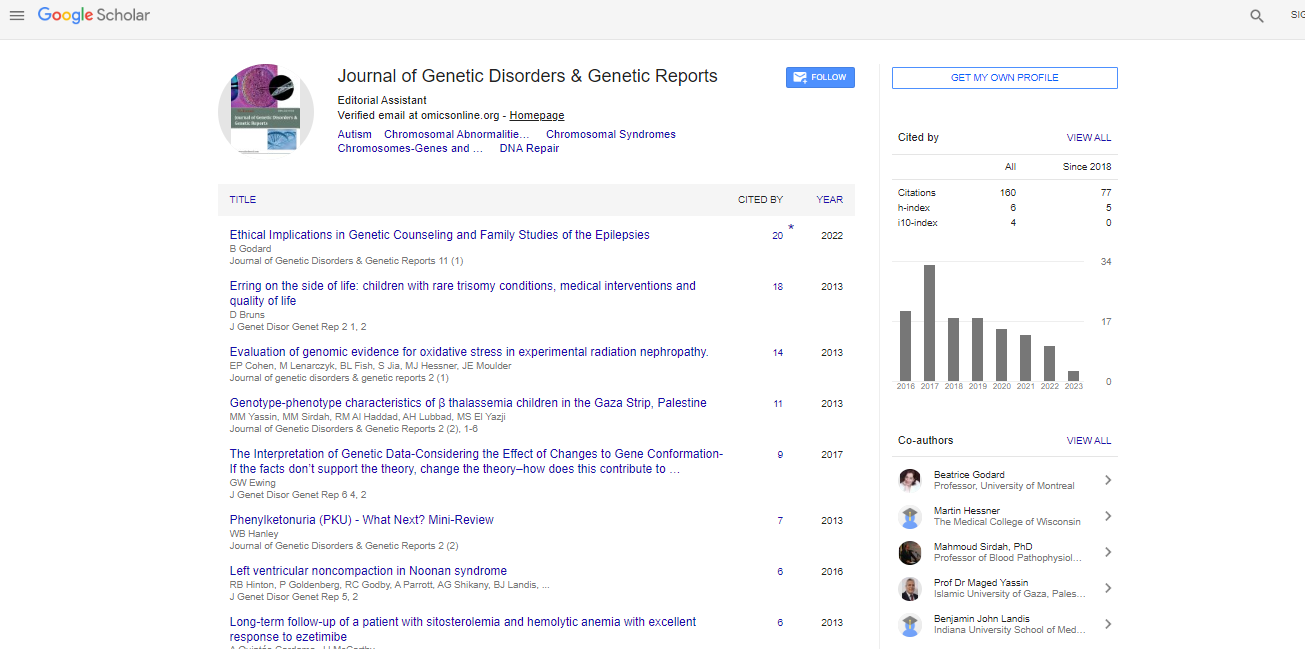Perspective, J Genet Disor Genet Rep Vol: 12 Issue: 4
Global Initiatives in Genomic Medicine: Collaborative Approaches to Treat Genetic Disorders
Amy Chen*
1Center for Genetic Research, University of Toronto, Toronto, Canada
*Corresponding Author: Amy Chen,
Center for Genetic Research, University of
Toronto, Toronto, Canada
E-mail: amychen5@gmail.com
Received date: 25 July, 2023, Manuscript No. JGDGR-23-113885;
Editor assigned date: 28 July, 2023, PreQC No JGDGR-23-113885(PQ);
Reviewed date: 11 August, 2023, QC No JGDGR-23-113885;
Revised date: 21 August, 2023, Manuscript No JGDGR-23-113885(R);
Published date: 28 August, 2023, DOI: 10.4172/2576-1439.1000218.
Citation: Chen A (2023) Global Initiatives in Genomic Medicine: Collaborative Approaches to Treat Genetic Disorders. Int J Genet Disor Genet Rep 12:4.
Abstract
Description
Genomic medicine has revolutionized our understanding and management of genetic disorders. The global initiatives explores in genomic medicine, highlighting collaborative efforts to address the challenges posed by genetic disorders are on a global scale. Genomic medicine has significantly reshaped healthcare by leveraging advances in genomics to diagnose, treat, and prevent genetic disorders. While genetics knows no borders, the challenges posed by genetic disorders are global.
Importance of international collaboration
Data sharing and research: International collaborations enable the sharing of genomic data and research findings, fostering a deeper understanding of genetic disorders and their global prevalence.
Rare disease diagnosis: Collaborative efforts aid in diagnosing rare genetic diseases, as rare variants can be challenging to identify within a single healthcare system.
Population genomics: Studying the genetic diversity of populations worldwide provides insights into disease susceptibility and the development of region-specific therapies.
Global initiatives in genomic medicine
The Global Alliance for Genomics and Health (GA4GH): GA4GH is a worldwide coalition focused on enabling responsible genomic data sharing and standardization. It promotes ethical data use, interoperability, and data protection across borders.
The International Rare Diseases Research Consortium (IRDiRC): IRDiRC aims to accelerate the diagnosis and treatment of rare diseases, many of which are genetic in origin. It facilitates international collaboration to achieve ambitious research goals.
The Human Heredity and Health in Africa (H3Africa) Initiative: H3Africa focuses on genomics research in African populations to address the burden of genetic diseases on the continent. It supports capacity-building and ethical research practices.
The 100,000 Genomes Project (UK): The UK pioneered largescale genomic initiatives, sequencing the genomes of patients with rare diseases and cancer. International researchers benefit from the project's data-sharing policies.
Clinical impact
Improved diagnosis: International data sharing and collaborative research lead to more accurate and timely diagnoses of genetic disorders, reducing diagnostic odysseys for patients.
Treatment advancements: Genomic medicine allows for the development of targeted therapies based on genetic profiles, improving treatment outcomes and reducing adverse effects.
Carrier screening: International initiatives help expand carrier screening programs, identifying carriers of genetic disorders to inform family planning decisions.
Global health equity: Collaborative efforts in genomic medicine contribute to reducing global health disparities by addressing the specific needs of diverse populations.
Challenges and future prospects
Data privacy: Balancing data sharing with patient privacy and consent remains a challenge, requiring robust ethical frameworks.
Resource disparities: Disparities in access to genomic testing and therapies between countries need to be addressed to ensure equitable healthcare.
Ethical considerations: International guidelines and ethical standards for genomic research and clinical practice must be harmonized.
Rare and neglected diseases: Continued efforts are needed to prioritize rare and neglected diseases on a global scale.Conclusion
Global initiatives in genomic medicine have created the path for collaborative approaches to over come genetic disorders. By sharing data, expertise, and resources, the international community is making significant strides in diagnosis, treatment, and prevention. As genomic medicine continues to evolve, addressing challenges related to data privacy, resource disparities, and ethical considerations will be paramount. With ongoing collaboration and a commitment to global health equity, genomic medicine promises to transform healthcare, providing concern and solutions for individuals and families affected by genetic disorders worldwide.
 Spanish
Spanish  Chinese
Chinese  Russian
Russian  German
German  French
French  Japanese
Japanese  Portuguese
Portuguese  Hindi
Hindi 



